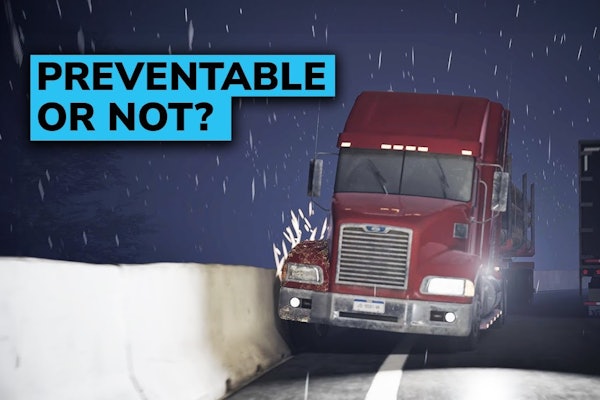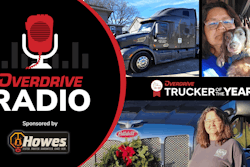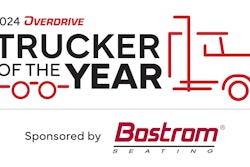Trucker Bill Ervin, who is dying from lung cancer, says his small trucking company has gone beyond the call of duty to make him comfortable.
In a photograph taken in October 2002, trucker Bill Ervin sits robustly on a Harley Davidson, an American flag bandana covering his head. His face sports a goatee, and his fleshy arms protrude from a tank top. He is a picture of health and cool.
Six months later, Ervin still has his wits about him, but his health is gone. The Vietnam War veteran, who chased Viet Cong from tunnels for the Army’s vaunted Big Red One, is gaunt, his face showing sunken pockets where his flesh was once thick. He has a time-release morphine patch on, and he’s waiting for the end at a Fort Wayne, Ind., hospice care center.
Before he dies, though, Ervin wants other truckers to know about Intrepid Trucking, the last trucking company he worked for and what its owners did to make his last days comfortable. He called Truckers News to tell us the story.
“Trucking companies like the one I worked for just don’t get their dues,” Ervin says. “Here’s a group of people who really care about their drivers. All trucking companies should be like this.”
Named for a retired-U.S. aircraft carrier, Intrepid Trucking was founded in 1997 as a one-truck operation. It now has 16 trucks and hauls nationwide from its base in Fort Wayne. Ervin went to work for Intrepid last summer after a lengthy and stressful divorce. Throughout his divorce proceedings, the 51-year-old says he had a nagging cough. But with three kids who needed child support and the divorce weighing heavily on him, Ervin ignored it and headed out on the road, hauling restaurant equipment and slot machines.
By November, Ervin was out of energy and losing weight. Intrepid personnel urged him to go to the doctor, but Ervin kept driving until they pulled him from the truck in February. Ervin, who was living in his truck and hotel rooms, had little money for a deposit or rent.
That’s when Bill Collins and Jerry “Oscar” Meyer, partners in Intrepid, stepped in. They rented and furnished a small apartment for their driver, loaned Ervin a company van and even provided a credit card and a company cell phone to ease Ervin’s suffering. Giving help, Collins says, seemed the right thing to do, even though the trucking company’s obligation to Ervin ended when he was unable to drive anymore.
“I was lying to them, telling them I was better than I was,” Ervin admits. “When I came off the road, I didn’t know the outcome – if I was going to be able to drive part time or if I was going to be off the road permanently.”
That was in February. “He was just starting to get more tired and more tired,” Collins says. “He had an indication that he might have cancer, but he took one last trip in February. He was real concerned about making his child support payments.” On that last trip, Ervin had to lay up in Reno, Nev., the turnaround city on his usual haul. When he finally made it back, the company took him out of a truck and put him up in a hotel.
Doctors told Ervin he had advanced lung cancer and six months to live. The ailing driver had lost dozens of pounds and was in pain by the time Intrepid paid the deposit and first month’s rent on a small apartment. The company furnished the apartment with a futon and a rocking chair. Employees stopped by to visit Ervin and bring food. Someone even brought him a television with a DVD and VCR.
Ervin got to his doctor’s office in an old van that Intrepid keeps so that drivers on layovers can get around. And he was able to keep up with his three kids – Geneva Patricia Marie, 7, James William, 6, and Darryl Conner, 4 – with a company-owned cell phone.
Even though Collins’ fleet has less than 20 trucks, he says the money isn’t that important. “We spend a lot of money on other superfluous stuff,” he says.
Still, to Ervin, who was moved in late April to a hospice, the support has been significant. “I’m overwhelmed at the response I got from Intrepid,” he says. “When I went to work there you could feel a certain atmosphere. They didn’t make you feel like they were doing you a big favor by giving you a job. When you walked in the door, you were family. You were a distant cousin they hadn’t seen in a while and wanted to get to know you and see how you were doing. As long as things panned out, you had a job there.”
The company doesn’t think its efforts were anything special, Ervin says. It hasn’t sought publicity. In fact, Collins says, “There’s a lot more of this kind of thing going on out there than people realize. The last thing on our mind was to go hunting publicity.”
“Truckers are weird sometimes,” Collins says. “They’ll argue and fight, but when someone needs help, they all pitch in.”
Ervin has been looking to spread the story himself. “I just want other truckers to know that there are still people out here that care about us,” he says. “People that think you’re not just a number, that you do a good job. In this day and world, this kind of help is so uplifting.”





